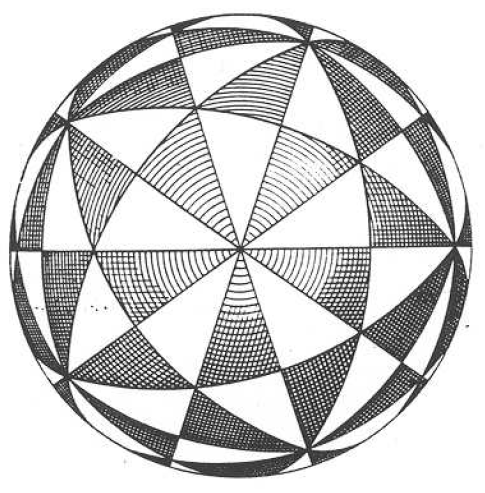Problem
For $x$ such that $f(x)\neq0$, define the $*$-derivative of $f$ at $x$ as
\[f^*(x)=\lim_{h\to0}\left(\frac{f(x+h)}{f(x)}\right)^{\frac{1}{h}}.\]What is the general solution to the $*$-differential equation
\[f^*(x)f^{**}(x)=f(x)?\]Solution
First we rewrite $f^*(x)$,
\[\begin{align*} \lim_{h\to0}\left(\frac{f(x+h)}{f(x)}\right)^{\frac{1}{h}} &= \lim_{h\to0}\left(1+\frac{f(x+h)-f(x)}{f(x)}\right)^{\frac{1}{h}} \\ &= \lim_{h\to0}\left(1+\frac{f(x+h)-f(x)}{f(x)}\right)^{\frac{f(x)}{f(x+h)-f(x)}\cdot\frac{f(x+h)-f(x)}{h}\cdot\frac{1}{f(x)}} \\ &= \lim_{h\to0}\left(\left(1+\frac{f(x+h)-f(x)}{f(x)}\right)^{\frac{f(x)}{f(x+h)-f(x)}}\right)^{\frac{f(x+h)-f(x)}{h}\cdot\frac{1}{f(x)}}. \end{align*}\]Now note that the piece in the big parentheses ends up being the limit defintion for $e$ and the power outside of it becomes $\mathrm d/\mathrm dx\ln(f(x))$ so
\[f^*(x)=\exp\left(\frac{\mathrm d}{\mathrm dx}\ln(f(x))\right).\]It is easy to show that
\[f^{**}(x)=\exp\left(\frac{\mathrm d^2}{\mathrm dx^2}\ln(f(x))\right)\]and in general,
\[f^{*(n)}(x)=\exp\left(\frac{\mathrm d^n}{\mathrm dx^n}\ln(f(x))\right).\]Solving the original problem
Now that we know more about the $*$-derivative, we may restate the original equation as
\[\exp\left(\frac{\mathrm d}{\mathrm dx}\ln(f(x))\right)\exp\left(\frac{\mathrm d^2}{\mathrm dx^2}\ln(f(x))\right)=f(x),\]or upon removing the exponentials,
\[\frac{\mathrm d}{\mathrm dx}\ln(f(x))+\frac{\mathrm d^2}{\mathrm dx^2}\ln(f(x))=\ln(f(x)).\]So we can instead find the soltuion to
\[g''(x)+g'(x)-g(x)=0\]where $g(x)=\ln(f(x))$. The characteristic equation for this is
\[r^2+r-1=0\]which has roots
\[r_1=-\frac{1+\sqrt{5}}{2},\,-\frac{1-\sqrt{5}}{2}.\]So
\[g(x)=c_1e^{-\phi x}+c_2e^{-\bar{\phi}x}\]where $\phi$ is the golden ratio and $\bar{\phi}$ is the conjugate golden ratio. Translating back to $f$ we conclude that
\[f(x)=\exp\left(c_1e^{-\phi x}+c_2e^{-\bar{\phi}x}\right).\]Further reading
The defintion of $f^*(x)$ given in the original problem is the geometric derivative. There is also a geometric integral given by
\[\lim_{\Delta x \to 0} \prod{f(x_i)^{\Delta x}}=\prod_a^b f(x)^{\mathrm dx}\]and playing similar games with limits gives a formula in terms of the Riemann integral
\[\prod f(x)^{\mathrm dx}=\exp\left(\int\ln(f(x))\,\mathrm dx\right).\]One may also check that
\[\left(\prod f(x)^{\mathrm dx}\right)^*=f(x)\]as we would hope!
